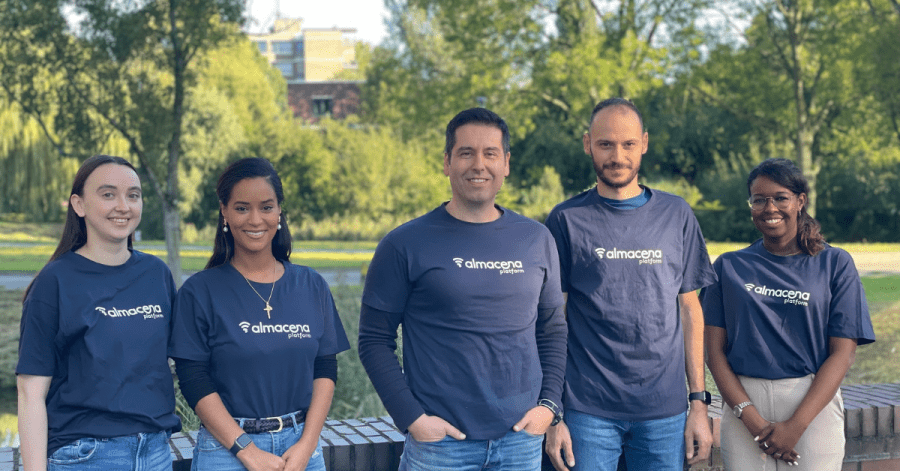- Almacena, the B2B marketplace for African agricultural products, that is co-founded by Dimo Yanchev and Karl Robijns, raises a €3.5M seed round co-led by Eleven Ventures and VentureFriends, with participation from existing investor Acequia Capital.
- The trading-as-service platform of Almacena brings traceability and transparency to the coffee supply chain industry as it provides industrial coffee buyers with a sourcing hub and B2B marketplace.
- The raised capital will be invested into expansion in the US market, reaching and servicing more producers globally, and exploring new use cases in other agricultural verticals, besides coffee such as cacao and tea.
The investment follows the rapid growth of the Netherlands-based startup that managed to build the world’s largest online African supplier catalog in less than 2 years. The catalog of Almacena represents 12% of the total African coffee export capacity and covers 6 African and 11 European markets.
In essence, the Almacena Platform is a coffee sourcing hub that works both as an Agritech and Fintech solution. It allows enterprise coffee buyers to procure coffee directly from the coffee producers, negotiate terms, sign contracts, and execute the deals digitally. Whereas, the proprietary Trade Dashboard of Almacena integrates finance, storage, logistics, insurance, and data collection from the producer to the warehouse or factory.
“Almacena’s mission is to create sustainable and transparent agriculture supply chains. The way Agri commodities, like coffee, reach the end market has not changed for hundreds of years and resulted in economic and social inefficiencies that we are ready to solve. The new technologies and the wider spread use of the Internet in remote rural communities allow us to redesign the supply chain. We believe that in the future commodity trading will be disbanded to allow for service competition, direct procurement, and value redistribution. Almacena aims to lead that change, starting with coffee. This round will help us to prove on a global basis that disintermediation in agriculture supply chains works,” Dimo Yanchev, co-founder and CEO of Almacena comments.
With a team of 23 people and offices in the Netherlands, Bulgaria, and Belgium, Almacena has selected Bulgaria as its R&D hub. Currently, more than 10 engineering and IT specialists of Almacena are working from Sofia.
The need and the market opportunity in Africa
As Yanchev explains, it is notorious that only 2% of all profits made across the coffee supply chain go to the producers. One of the problems in the coffee supply chain is that to enter the international market, producers sell coffee beans to intermediary traders in their local currency instead of in US dollars. By doing so, the real producers are left anonymous across the supply chain and receive unfair compensation for their produce. As of now, to source coffee, roasters, and importers rely on a network of aggregators and traders because they lack the know-how and the finance
“This is a universal problem that is often encountered in other supply chains in the agricultural industry. We started by developing a solution with a specific use case for the coffee sourcing industry in Africa but our goal is to service other verticals in the agricultural industry globally. In addition, we aim to open up the African coffee market not only to Europe but also to American and Asian markets,” Yanchev highlights.
To solve structural barriers in the Agri supply chain, Almacena connects industrial buyers directly to origin suppliers. Its platform serves coffee procurement teams and allows them to build and manage their own sourcing channels, digitalize the supply chain operations, reduce team costs, and gain on price. On the other hand, by using the trading-as-a-service model and selling directly in US dollars, producers can make more fair profits without remaining anonymous players in the supply chain.
“We are breaking a couple of myths connected to the African market, the biggest one being that African producers are not ready to implement digital solutions. Even though it is true that 5 years ago, the idea of Almacena would not have been able to succeed, today in most of Africa people have access to the Internet and mobile phone. Therefore, besides introducing an innovation in the coffee supply chain industry, we are also demonstrating the opportunity for other digital companies in the untapped African market,” Yanchev explains.
According to Ivaylo Simov, Founding Partner at Eleven Ventures, Dimo and his team are taking a legacy trading business to a new level. He explains that the startup is riding a new wave of b2b marketplaces in the food category, offering traceability, sustainability, and inclusion elements as part of its business model.
“Almacena is adding clear value to both suppliers and buyers of green coffee, facilitating the transaction by improving efficiency, adding transparency, and digitizing the entire process,” George Dimopoulos, Partner at VentureFriends adds.
What is the next stop for Almacena?
Since 2021, when Almacena launched its coffee sourcing marketplace, the startup has onboarded as users over 160 cooperatives with 300,000 farmers. The platform serves leading importers and roasters in 11 European countries, including some of the world’s biggest traders and leading industry buyers.
“On a global scale, Africa contributes with around 10-15% of the total coffee supply, and the biggest coffee producers are outside of Africa in countries like Brazil, Columbia, and Vietnam. Therefore, in order to have more impact, we need to build a presence in more countries, starting with Latin America,” Yanchev shares.
In the next 12 months, Almacena will be working to expand its offering to large-scale buyers globally, to expand further in Africa, to add South American origins, and expand services to American buyers.







